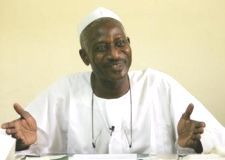Chadian opposition contests turnout figures for Deby election
MAy 5, 2006 (N’DJAMENA) — Chad’s President Idriss Deby appears set to win a new term, but his government and his opponents are contesting the turnout figures for the presidential election.
 After the opposition called for a boycott, Deby needed a strong turnout at Wednesday’s vote to give him legitimacy as head of one of Africa’s newest oil producers.
After the opposition called for a boycott, Deby needed a strong turnout at Wednesday’s vote to give him legitimacy as head of one of Africa’s newest oil producers.
Independent National Electoral Commission Chairman Ahmad Mahamat Bashir told the Associated Press on Thursday that at least 75 percent of the 5.8 million registered voters cast ballots. But Ibni Oumar Mahamat Saleh, spokesman for the main opposition alliance, said the turnout was below 10 percent.
“The people have supported the position of the opposition,” said Saleh, of the 19-member Coordination of Political Parties for the Defense of the Constitution, which called the boycott.
AP reporters saw just a handful of people voting in N’djamena, the capital.
The vote came nearly three weeks after rebels, who include Deby’s relatives, failed in a bid to capture the capital. The insurgents staged the attack from bases in the volatile region where Chad meets Sudan’s Darfur province.
Deby seized power in a 1990 coup and then won two previous elections criticized as fraudulent. In Wednesday’s election, three of Deby’s allies and a minor opposition leader provided a token challenge. Official preliminary results are expected by May 14.
Deby had rejected opposition demands to postpone the election, arguing it would create a constitutional vacuum because his second term had come to an end.
Saleh said the alliance will continue to demand talks among all political players because “there is a crisis that is going to get worse with this election.”
Power has never changed hands at the ballot box in Chad. Deby’s 1990 takeover brought a semblance of peace after three decades of civil war and an invasion by Libya, but he has become increasingly isolated in recent years.
Last year, Deby pushed for a referendum to change the constitution to allow him to run for a third term. The amendment passed as the opposition boycotted the vote, but the move appears to have added to discontent among the 10 million Chadians.
Chad is struggling with discontent over its poor economy, and unhappiness has intensified over the failure of a boost from the country’s oil field, which went into operation in 2003.
Unrest also has spilled over from Darfur, where Sudan’s Arab-dominated government is accused of encouraging a campaign of destruction aimed at civilians in African farming villages that are the base for a three-year-old rebellion. Sudan charges that Chad supports the Darfur rebels. Chad, in turn, accuses Sudan of backing eastern Chad rebels.
Some 200,000 people who have fled the fighting in western Sudan have taken shelter in eastern Chad. The April 14 closure of the border by Chad is also hampering efforts by the World Food Program to feed 500,000 more people in West Darfur. Much of its food comes from Libya through Chad, the agency said.
Few international election observers were in Chad for Wednesday’s vote and they were not expected to make their assessments public, instead reporting back to their own governments.
After provisional results are announced, candidates will have 10 days to make any challenges before the Constitutional Court, which will declare the final results.
(ST/AP)
